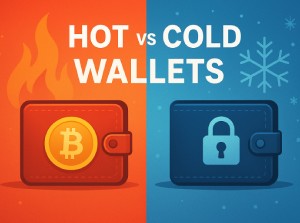Hot Wallets: Convenience with Vulnerability

Hot wallets, or commonly digital wallets connected to the internet, are usually software-based applications and include the types of apps and browser extensions, setting up and using of which are easy. Since they run on the internet at all times, they provide the quickest access to crypto assets.
✅Advantages of Hot Wallets
- The Wallet Is Easy to Use: Considering hot wallets to be the easiest to use is correct; hence, if you are a beginner, you should be able to access your cryptocurrency fast enough. You can store different kinds of cryptocurrencies in the wallet and manage them on the go while paying for goods and services in almost no time.
- Accessibility: Because these wallets are online-based, they can be accessed from almost any device-an Android phone, a Mac, a Windows laptop, or any other device. Online wallets negates the need to worry about losing your keys as those keys are stored on the platform.
- Often Used for Transaction Purposes: If you are a frequent trader, then such a wallet would suit you very well. It allows for instant transferring of funds, checking of balances, and carrying out trades with agility.
❌Disadvantages of Hot Wallets
- Vulnerable to Hacks: As long as a hot wallet remains online, these cyberattacks can target these hot wallets, and once the private keys are compromised, it is an irreversible loss of funds for the holder.
- Insecure: Although theoretically, by using adequate encryption and security procedures, hot wallets protect your funds, it would almost never be so safe as a cold wallet. The internet connection may thus be a hazard when storing large amounts of cryptocurrency.
- Service Providers: The great majority of hot wallet providers are provided by third parties. Should the provider be on downtime or be hacked, your cryptos are in jeopardy. Plus, you might not have a say on what security measures are implemented on the wallet.
Cold Wallets: Secure but Less Convenient

Cold wallets act as offline storage solutions for your crypto. These wallets are never connected to the internet and are usually hardware devices or paper wallets that allow the storing of private keys securely.
✅Advantages of Cold Wallets
- Enhanced Security: Cold wallets have the greatest security level, an advantage they maintain over hot wallets. Being offline, they cannot be hacked or attacked through the internet. This, therefore, makes them apt for storing large quantities of crypto or long-term holding.
- Control Over Your Keys: Cold wallets put you in total control of your private keys, unlike hot wallets that hand over your private keys to third-party service providers. This means that if you have cold wallets, you are the sole person with access to your assets.
- Offline Storage: An online attack cannot assault an offline wallet, unlike in an online scenario. So, if you intend to keep your crypto for a very long time and seldomly make transactions, then a cold wallet is an even safer choice.
❌Disadvantages of Cold Wallets
- Inconvenient: One grave disadvantage cold wallets present is in accessibility. Should you need to move your crypto funds between wallets quickly or frequently, then commencing with a cold wallet might seem a lot of work. You must physically connect to a PC or mobile device to access your funds.
- Loss or Damage: In case you lose your cold wallet (hardware or paper wallet), you can lose access to your crypto forever. So make sure that your cold storage is kept very safely and that you have backed up everything you might need to recover it, such as seed phrases, to another secure place that will allow you to restore your password when the time comes.
- Limited Accessibility: Cold wallets don't provide full accessibility as compared to hot wallets. They serve, rather, as long-term storage, so if you require your crypto all the time, then consider a cold wallet as maybe the wrong choice for you.
How to Choose Between Hot and Cold Wallets?
In choosing between a hot and cold wallet, how often you are in contact with your crypto, the quantity you hold, and your own requirements in security must be considered.

Frequency of Use
If you're a trader spending cryptocurrencies daily, hot wallets are ideal for convenience and fast transactions. However, if you're holding crypto for the long term and don’t need immediate access, cold wallets are better for safekeeping, keeping your assets offline and safe from cyber threats.
Amount of Crypto and Security Needs
Hot wallets are suitable for small amounts of crypto used frequently but shouldn't hold large sums long-term due to online vulnerabilities. Cold wallets, keeping private keys offline, offer stronger security, making them ideal for larger amounts or long-term investments. If security outweighs convenience, cold wallets are essential for protecting against hacks.
Decide on What Works for You
The hot wallets vs cold wallets debate cannot have a straightforward answer with the greatest choice depending on your specific use case and security need. Hot wallets are best if you are trading frequently or need fast access to your account.
A cold wallet for long-term storage offers better security due to its offline protection. Many crypto users use both: just a few hundred dollars in hot wallets for easy access and bigger chunks kept tucked away in cold wallets for security.
In case you missed
There are two main types of wallet:
— Defi Krab 🦀 (@Defi_Krab) August 16, 2025
1. Hot Wallet: These are online wallets. We can download them on our devices (Less secure).
Eg: Metamask, Solflare, Nightly...
2. Cold Wallet: These are offline wallets. It is a physical type of wallet (more secure).
Eg: Ledger, Keystone... pic.twitter.com/RiChEJRNq1